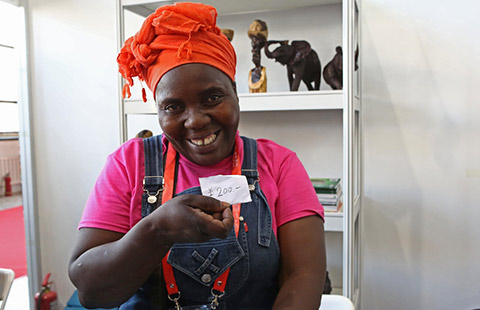Innovation proves driving force in China

Editor's Note: The Communist Party of China will hold its 19th National Congress on Oct 18. In the runup to the meeting, China Daily asked prominent company executives to provide their views on economic developments here and the country's global leadership role. The first two are Jeremy Hunter, president for Henkel Greater China, and Thierry Garnier, president and CEO of Carrefour China.
What has been China's biggest achievement during the past five years and what is its most notable change?
Jeremy Hunter: It has to be China's transformation toward becoming an innovation-fueled economy. China is upgrading its manufacturing industry to become more high-end, environmentally friendly, intelligent and service-based. This is shifting focus from "productivity expansion" to "productivity enhancement".
 |
|
Jeremy Hunter, president for Henkel Greater China, which is part of Henkel Group, a multi-national consumer and industrial goods company. [Photo provided to China Daily] |
Thierry Garnier: During the past five years, I was deeply impressed by the energy, speed and innovation of China. The rapid economic development demonstrates the vitality of China's market.
The past five years saw the emergence of services designed to help consumers. The introduction of shared bicycles solves "the last mile "problem. The development of O2O (online to offline businesses) makes life more convenient.
For enterprises like us, this offers a wide spectrum of reference data, based on the purchasing habits of customers. This enables us to have a sharper insight into their needs.
What three words would you use to describe China today?
Hunter: Innovative would be one. China is shifting toward an innovation-driven economy. For example, the country is arguably the world's leader in e-commerce and mobile payment, as well as the home of leading internet companies such as Alibaba (Group Holding Ltd) and Tencent (Holdings Ltd).
Sustainable would be another. China has prioritized sustainable development as an important part of its national agenda.
Finally, I would say collaborative. China is becoming an increasingly important force to foster regional and international cooperation.
Garnier: Innovation, openness and happiness represent the feature of China today. Entrepreneurs are seeking to propagate Chinese culture, commodities and concepts worldwide with innovations.
Meanwhile, they also modestly absorb technologies and cultures from around the world, and actively communicate and cooperate with nations worldwide.
What is the biggest challenge China faces and how can the country overcome it?
Hunter: As continued economic expansion exerts an increasing strain on the environment, one of China's biggest challenges will be to balance economic growth with sustainability. This is not limited to China, but applies to all countries around the world.
To overcome this, we need innovative solutions to optimize our processes and reduce, if not eliminate, environmental impact. We also need policy and societal support to achieve our goals together. China is already making progress in overcoming this challenge.
Garnier: China has been confronted with the issue of balancing its eastern and western economic development. Recent years witnessed the efforts of the Chinese government to narrow the gap between its western and eastern regions, with significant success. The rapid progress of China's digital and transport technologies will help transfer the resources of rich areas to western regions in a better way.
 |
|
Thierry Garnier, president and CEO of Carrefour China, which is part of Carrefour SA, one of the largest hypermarket chains in the world. [Photo provided to China Daily] |
For Carrefour, we cooperate with the government to construct a more complete retailing system, while developing new technologies and launching new projects. These include Direct Purchase and China Quality Line with QR codes.
We prioritize natural fruit and vegetable production areas, including those in western regions. We are delighted to see income growth of farmers in central and western regions increasing through this cooperation and technical exchange. The project also enables eastern and western consumers to experience high quality produce at better prices through our store network and online business.
What are your expectations for the 19th National Congress of the Communist Party of China and what key issues will you be watching for?
Hunter: There is huge global attention on the Congress, especially around the composition of the new Chinese leadership. Regardless of any changes, I expect the Congress to reaffirm China's development agenda and strategic priorities.
Garnier: Carrefour has been in China for 22 years and our exploration and innovation of various formats are inspired and supported by national policies. We have grown together with the country and we change together.
As for the 19th National Congress of the Communist Party of China, I'm looking forward to the policies to maintain fast economic growth. A fast-growing economy in China will offer us a more stable environment and will influence the future development of the retail industry.
What is your impression of President Xi Jinping?
Hunter: I think he is a very visionary leader. The Belt and Road Initiative and the Asian Infrastructure Investment Bank are great examples of his forward-looking proposals. On the domestic front, he has also advocated for China to carry out industrial upgrading by developing smart manufacturing.
Garnier: President Xi Jinping has unique political wisdom. We can see China is leading the world in many aspects, such as the digital economy, culture and industry under the leadership of President Xi.
His globalization (views) at the World Economic Forum in Davos earlier this year was of considerable significance for economic development, cultural integration and resource-sharing worldwide.
How do you view China's role in the world today?
Hunter: The country is already playing an indispensable role as it takes a more proactive part in shaping the future of the global economy. China is vital for the stability of the global economy and is also increasingly creating value for the world through its innovation.
Garnier: As the second largest economy in the world, China shoulders important missions in the globalization process. This is not only about trade and economic exchanges with different countries, but also about export values and culture.
The country today demonstrates an overwhelmingly rapid development trend in terms of culture and economics."Made in China 2025" is gradually transforming into "Innovated by China", with new brands, new products, and new technologies.
Could China's experience and practices be used to solve pressing global problems?
Hunter: In a world where we are seeing an unprecedented tide of rising anti-globalization, China has shown the path forward for forging closer international trade and collaboration. Initiatives such as the Belt and Road and the Asian Infrastructure Investment Bank are based on sound fundamental principles of inclusiveness, mutual benefit and common prosperity for all participants.
Garnier: China sets an example in solving global problems with its experience and practices as the world's most populous country. At present, the government prioritizes anti-corruption and has achieved significant results.
In addition, the sustainable development strategy of Beijing exerts a far-reaching impact on the world. Sustainable development was discussed as an important topic at the G20 Summit in Hangzhou last year.
By promoting stable and comprehensive reforms, China seeks to improve its domestic development model and realize sustainable development. It also provides assistance for developing countries to cope with an international financial crisis.
What will China be like in five years time and what is the country's long-term future?
Hunter: I see China as taking on an increasingly important leadership role in promoting international trade and economic cooperation. Domestically, I anticipate that the rising middle class will continue to provide impetus for sustained economic growth.
Also, I would not be surprised if the country pioneers new technologies and innovations in critical sectors, such as healthcare or renewables. Overall, I am highly upbeat about China's long-term future, and eager for Henkel to be a part of it.
Garnier: I believe the country will be able to maintain its healthy development trend. The friendly and open environment in China provides enterprises with a solid foundation for development. This in turn means that there will be great potential in the future for all sectors, including retail.
What is the most unforgettable experience you have had in China or is related to the country?
Hunter: The most unforgettable experience has been my visit to the Great Wall last year. This is a symbol of China which represents the country's long history and splendid culture.
It was even more magnificent than I had thought, especially with the sunshine and blue sky we had that day. During my visit, I stopped by Henkel's memorial stone, which was built to memorialize the group's donation for the renovation of the Mutianyu section in 1988.
It reminded me of how Henkel started and how much we have accomplished here. I felt very proud.
Garnier: There are two moments that are unforgettable. The first one was in 2015, which marked the 20th anniversary of Carrefour's development here. By then, we had 230 hypermarkets and 10 convenience stores in 58 cities.
I have witnessed the exploration and reform of Carrefour since it entered the market in the 1990s, blazed a trail with Chinese characteristics. Such a remarkable accomplishment was based on stable development and the fast economic growth in China.
The second one was last year and covers reforms in the retail sector. The central government proposed the integration of "offline and online" channels in a bid to support the development of the real economy. Now, with the prosperous development of e-commerce in China, physical retailers are accelerating diversification with the help of big data and new technology.
What will boost growth in the country this year and in 2018?
Hunter: China's clear development agenda and strong leadership bring focus and stability that create a favorable environment for growth, now and in the future. As China transforms to become an innovation-driven economy and upgrades its manufacturing industry, I firmly believe that it will achieve more "quality" growth, to become a true manufacturing power.
Again, in my opinion, the challenge currently facing the Chinese economy is the balance between economic development and sustainability.
Garnier: Openness, cooperation and innovation are the most favorable factors for China's growth. Great efforts have been made by China to develop domestic industries and create a very stable domestic environment. After experiencing staggering growth, China has entered a stable development period. How to use innovation during this period before the next development peak is the biggest challenge faced by the economy.
Honestly, I have my own opinions. Although the economy is developing rapidly, it still suffers from unstable structures in some fields.
For example, with the real estate economy serving as a growth engine in recent years, the structure remains unbalanced. In addition, the country's aging society, education and health will become topics of significant importance.
As a leader with a Fortune 500 company, which sectors do you think offer the most opportunities for development?
Hunter: I see great opportunities for the development of the manufacturing industry. China is fostering smart manufacturing, which is similar to Industry 4.0 in Germany. Both seek to embed automation and digitalization to optimize the manufacturing process, and drive economic growth.
At Henkel, we have consistently grasped the great opportunities provided by digitalization and Industry 4.0. We have successfully piloted the smart factory concept at 10 sites across Asia. We want to accelerate digitalization along the entire value chain to achieve faster decision making, higher productivity, and greater safety and sustainability.
In addition, e-commerce in China is leading the world and will provide tremendous opportunities in the future. We have been taking this opportunity to cooperate with e-commerce platforms. For example, our beauty care business achieved great success on Alibaba. Our adhesive business also launched its flagship store on Alibaba.
Garnier: I think there are two. The first are innovation-based industries with new technology and high quality services. With the rise of the middle class, people's consumption demands have been transformed gradually from prices and costs to the pursuit of lifestyle.
That is why we launched the "multi-format and multi-channel strategy". Scientific innovation has become a driving force for development. In the future, high quality produce, will be extremely popular with customers.
Secondly, sustainable industries such as health, cultural and environmental protection will promote China's status on the global stage. After all, sustainable development is a topic that the entire world is concerned about.
What opportunities will the Belt and Road Initiative throw up for China and the rest of the world?
Hunter: The Belt and Road Initiative creates considerable demand for products, investment and economic cooperation. It stimulates the expansion and upgrading of China's manufacturing industry, as well as providing greater market opportunities for the development of China's economy.
As a multinational company, we are delighted to help facilitate the upgrading of China's manufacturing industry and grasp the market opportunities generated by cooperation. The Belt and Road Initiative has also set a great example for international cooperation. This will strengthen the foundation for the long-term stable growth of the world's economy.
Garnier: China has developed economic partnerships with economies along the Belt and Road Initiative. I see it as a 21st century "Silk Road "and an extremely admirable project. China always embraces societies with openness and inclusion.
The country has established friendly relationships with neighbors and promotes cooperation and collaboration with major nations.
What are the most innovative trends or products in China?
Hunter: The country is implementing the "Internet Plus" initiative, which aims to transform and upgrade industries through the internet and digitalization. At Henkel, we have a similar agenda to leverage digitalization and Industry 4.0 to accelerate our business growth, better serve our customers, optimize our processes and transform the entire company.
Garnier: I believe there will be strong growth in electronic products. With accelerated upgrading and improved quality of electronic devices, prices become increasingly affordable for consumers.
Electronic products that were expensive and seldom available in supermarkets in the past can now be found in our stores, as living standards here rise and prices fall.
China is known as a manufacturing giant, but what will be the country's "calling card" in the future?
Hunter: As it transforms into an innovation-driven economy, innovation will be the country's core competency. China has already demonstrated its potential for innovation in areas such as the internet, and there will be more in the future. The scale of its economy and the availability of investment capital provide fertile soil for more innovation to take root and blossom.
Garnier: I believe it will eventually become the world's No 1 market because of stable growth and global strategic cooperation. With a consumer market of 1.3 billion people, China has become the world's largest import and export market.
Such a huge market will definitely attract the investment of overseas resources and bring a great number of opportunities. This will significantly contribute to enhancing China's competitiveness.

























